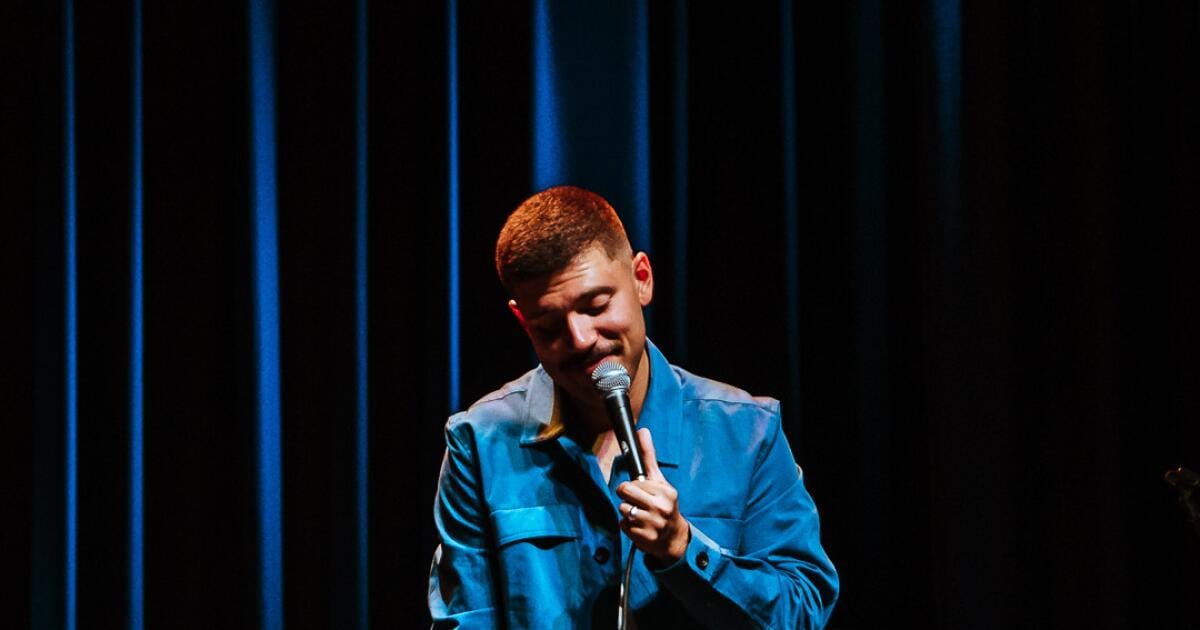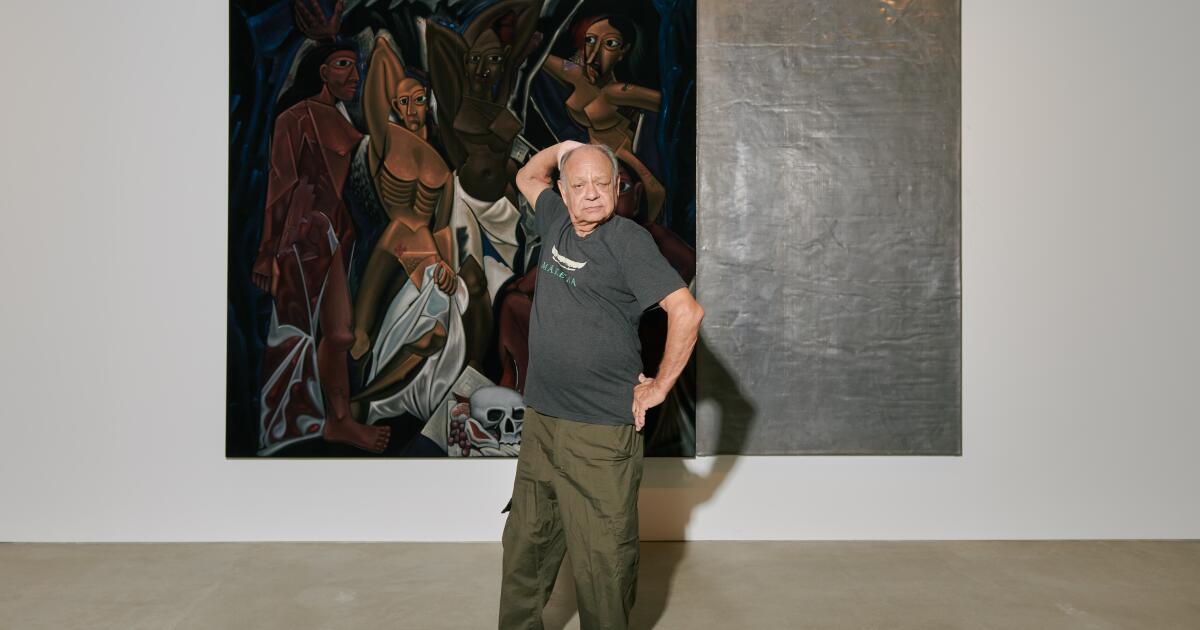Angelo Colina wants laughs in Spanish in spite of everything
Watching comedians perform under the thumb of a government that is actively attacking swaths of its population is nothing new for Angelo Colina.
The 31-year-old joke teller was born and raised in the Venezuelan city of Maracaibo as the South American country faced continuous political turmoil under the prolonged presidencies of Hugo Chavez and Nicolás Maduro, among other economic, humanitarian and democratic challenges — such as hyperinflation, increased rates of starvation and decreased access to adequate healthcare services.
Colina — who carved a lane in the Americas as a Spanish-language comedian and has garnered millions of views across social media due to his whip-smart jokes and playful crowd work — left his home country at 21 and began pursuing a comedy career after moving to the neighboring Colombia.
It was the audacity of Venezuelan acts — like Nacho Redondo, Led Varela, Erika de la Vega and Luis Chataing, who spoke out against oppressive government rule — that inspired Colina and informed his worldview.
“As someone who grew up watching [them] perform and doing jokes about the government in Venezuela while they still could, that was my example,” Colina told The Times. “They really fought censorship as long as they could.”
As a self-described “double immigrant,” first to Colombia and subsequently Salt Lake City, the New York-based comedian said he felt as though he’s already lived four lives — all of which have helped shape his comic eye and sharpened his observational skills.
The current political climate, the continued artistic acceptance of Latino art in the U.S. and the ongoing Immigration and Customs Enforcement raids throughout the country were at the top of mind as Colina spoke with The Times ahead of his Oct. 11 performance at the Hollywood Improv.
This interview has been edited and shortened for clarity.
What has it been like doing comedy shows for a Spanish-speaking crowd in the time of ICE raids?
I start my shows by saying, “We’re doing comedy. You guys are not noticing, but we’re doing comedy in Spanish. In the United States in 2025. This is the closest to punk that we’ve ever been.” And people start laughing about it, because [federal officials] backed up by the law to say that if you speak Spanish, then they can ask about your current immigration status. And it’s like, all right, let’s speak Spanish. We’re not doing anything wrong. We’re just celebrating our culture in every show we do.
Do you like the idea of being a little punk?
I think it just became that; it was more organic. I wasn’t thinking that I’m part of a larger movement that started by other people of doing comedy in Spanish, which has always been and it’s certainly been a cool thing to me, but now it’s counterculture for sure. But I don’t need to invite people to my show because it’s counterculture, that’s not the reason why I want to sell. People have been freely celebrating being Latino for years already and I don’t think there’s any way to stop it, honestly.
Have you felt a change in your audience at all in recent months?
Unfortunately, I have. I do, however, have to give a shout-out to all the non-Latinos coming to the shows. They are coming because they want to see a form of Latinidad in its own rhythm and they are in love with our culture and they come and they support it.
I see the hesitance to come to shows a lot more with people that used to come with their parents. A lot of people born in the States, but with immigrants parents, used to come to my shows. My shows have always been a place where people finally can do something with their parents. Normally, they don’t find a lot of activities where they can share something like that. So their parents are now the ones that are faster on the joke and they are the ones that are catching up. It’s always been part of my whole demographic.
That’s the shift I’ve been seeing. A lot of people have reached out to me and said, “I would love to go to your show, but I don’t think it’s a good idea right now.” I got a lot of Venezuelans coming to my shows and saying, “This is the last show I’m going to in the States. I’m leaving next week. I got a deportation letter.” I got screenshots of it and they’re saying they’ll see me in Colombia or Argentina. It’s been pretty emotional. Honestly, this might be the first time I actually get emotional talking about it, but it’s hurt a bit.
It must be nice for the audience to have that time at your show to be who they are, but are you addressing the craziness of everything in your act?
I’m not pretending that’s not happening out there. Comedy gave me the opportunity to become a resident in the United States. I got my visa because of the people coming to my shows. It would be disgraceful for me not to talk about what’s happening or not to at least try to be of help, even if it’s by making people laugh.
Has it been difficult navigating the U.S. comedy scene as a fully Spanish act?
I would say dealing with the industry can be tougher sometimes because of the lack of awareness of how powerful Latino crowds can be. Luckily, it’s changing a bit because of musicians like Bad Bunny and Karol. Everything artists like them have done has made people organizing shows say, “Hmm, let’s see. Maybe I won’t give the Spanish act a Tuesday night slot. Let me try them on a Thursday or Friday night or a Sunday.” And then they see the room packed and people spending money, just having a great time.
I complained a lot about the industry last year and now I’m in a phase where I just want to do this for my people for as long as I can. I’m just enjoying being able to perform.
How has it been seeing Latinos in the U.S. further embrace Spanish-language content?
It’s not only Latinos; people from all backgrounds are interested in our culture. In L.A., a lot of Latinos that were born here didn’t have the chance to learn Spanish or practice it as much, but they love the culture. You also see a lot of people that are non-Latino at my show because they’re interested in Spanish.
It’s like music. There’s no merengue in English because there’s no need for merengue in English. If you are a non-Spanish speaker and you like the rhythm, you’re gonna come to the music. And that’s happening at my show and I’m learning how to navigate it. Sometimes I see people making faces and you don’t hear the laugh coming back at you. Then the show ends and everyone’s DMing me and then they’re signing at the very end of the DM because white people love doing that.

